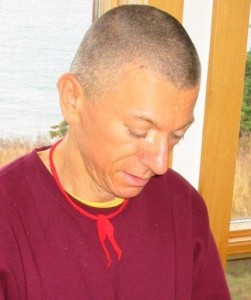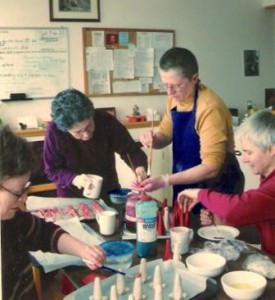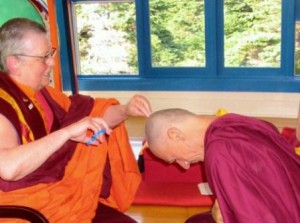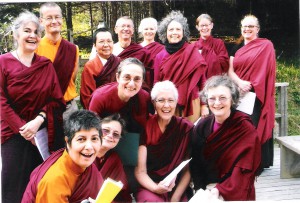Friday
Atlantic Canada, Featured Stories, International ProgramsDiscovering Enlightened Society at Sopa Choling
Shastri Chuck Whetsell describes his experience of discovering enlightened society, slogan by slogan, during his three-year retreat at Sopa Choling. Be sure to read the fourth article and click here to view the entire series.
I loved the first time I meditated all day long. With mind alert and body relaxed, I felt I had come home. That taste of intensive practice made me want more; I began doing group and solitary retreats. During intensive practice I felt more authentic and alive than during daily activities, which often seemed like the mere execution of conditioned responses, however complex and varied in form. A six-month retreat left me feeling especially grateful for what I had experienced. Wanting to share it with others, I married, acquired a stepchild, and entered a doctoral program. I became active in teaching and administration at the local meditation center. I started a career. In this way, twenty years passed.
Those years were good, and I think I helped people. Still, my commitment to the path of meditation was languishing, and I began comparing myself to friends who had continued with retreat practice. I had a sense that there was something important to know prior to my death, which I could come to understand if I were to engage again in intensive meditation. When I heard about the three-year retreat program at Sopa Choling, the retreat facility of Gampo Abbey, it seemed like an ideal way to make up for lost time, and to reconnect with the power of prolonged meditation in an undisturbed environment.
When I arrived at Sopa Choling, I found a richer–and messier– situation than I had envisioned. Even though most of the day was spent in solitary meditation, I felt awash in the energies of other people. We fulfilled rota assignments together, planned and executed group practices, and negotiated sharing bathrooms and hallways. Living in this dharmic pressure cooker, like many retreatants before me I discovered afresh one of the hidden teachings of Sopa Choling–that community life itself is a powerful vehicle for transforming confusion into wisdom. As a student of the Sakyong lineage, this hidden teaching has blossomed for me into a living experience of the profound truth that enlightenment can only be attained within the confines of society.
How does this work? Simply put, the Sopa Choling program is a three-year voyage of practicing meditation in a submarine, surfacing once a year for extended shore leave, but otherwise being on active duty in very close quarters. Interdependent and relying on each other, retreatants do not have the option of avoiding one another. Everyone is invited to your birthday party, whether you like them or not. In the proximity of community life, projection is heightened, the veneer of politeness rubs off, and the blood from raw wounds mixes generously among community members.Such an exposed situation, with no escape and no possibility of impression management, leads to hopelessness about ever getting what you had always thought you wanted. Deep revulsion for the dharmas of samsara sets in. Motivated by a desire to be cured of the “me” sickness, one practices with an urgency not usually felt in daily life, where so many opportunities for deception are offered. On this ground of genuineness, practice penetrates beyond any wishful thinking one may have about becoming realized.
By itself, the living situation at Sopa Choling would neither clarify nor transform confusion. The key step comes from mixing the shocking level of insanity one can no longer deny in oneself with the lovingkindness practice of lojong contemplation. Starting with the 2004 retreat cycle, retreatants have used Chogyam Trungpa’s book on lojong, Training the Mind, as an adjunct to the main retreat practices. The first ten minutes of each individual practice session are spent contemplating slogans such as “Regard all phenomena as dreams,” “Be grateful to everyone,” and “Drive all blames into one.” By looking at the interpersonal events of community life in light of these teachings, long-held attitudes of selfishness and defensiveness began to change.
Four times a day, week after week, month after month, and year after year, klesha was exposed to the light of prajna, illuminating the hollowness of blaming others for our distress. The surprising truth is that driving all blames into oneself does not lead to weakness and despair, but rather to feeling capable of influencing the quality of one’s life. The nearly inevitable period of feeling stuck, overwhelmed by what has been discovered in oneself, yields to strength and a sense of possibility. Certainty arises that if one has the courage and exertion to face oneself again and again, it is possible to purify one’s karma.
At this point love of virtue dawns. For the sake of one’s own well-being, acutely aware of the toxic effects of complaint, hatred, and competition, one begins to refrain from such poison. It feels good to think of others, appreciate their qualities, and wish them well. Practicing virtue brings health. Like an athlete whose muscles are becoming well-trained, it becomes joyous to flex and stretch, using one’s capacity to negotiate the challenges of interpersonal exchange. Situations that formerly cramped and stung become occasions for expressing one’s skill and strength. “Profit and victory to others; loss and defeat to myself” provides the fuel that allows one to soar above the knee-jerk reflex to take offense, defend, get even, or seek recognition.As nourishing as virtue is for oneself, the on-going practice of lojong invites a further step. In such close quarters, one sees the suffering of others intimately. Having developed tolerance and acceptance for one’s own shortcomings, one extends spontaneous caring to neighbors caught in sorrow, doubt, or self-hatred. One’s own episodic forays into klesha activity heighten the awareness that we are all making a journey, and that others are to be appreciated and respected for their efforts along the path. This further softening permits a profound kindness to develop. It permeates interactions, fundamentally changing the atmosphere in which the journey takes place. Cradled in unconditional support, one is safe to trust and relax into the main practices of the retreat, which grow in effectiveness and transformative power.
What did I learn about the necessity of community for discovering my awakened nature? First, my emotional turmoil is a projection onto others of my own inner faults. In solitary retreat, without the challenges of community life, my faults might remain hidden, allowing me to experience a temporary peace but depriving me of the opportunity to work on my habitual tendencies. Further, it is only by being vulnerable that I become genuine to myself, and true vulnerability requires the presence of others. In the same way, my training in unconditional love for all beings must be grounded in caring about real people.
I now understand that enlightened society is not a group of people who are enlightened. It is a physical and social environment that beckons one again and again to soften, let go of barriers, and expand out into a world vibrating with brilliance and awareness. The community of three-year retreatants at Sopa Choling, along with the practices of the retreat, provided just such an environment for me. For our Shambhala community, it is a potent working model for establishing enlightened society on earth.
 _______________________________
_______________________________
Shastri Chuck Whetsell completed the three-year retreat at Sopa Choling in July 2010. He lives in Birmingham, Alabama, where he is a practicing psychologist and rolfer.
______________________________
SOPA CHOLING ANNOUNCES A NEW THREE-YEAR RETREAT CYCLE
Empowerments scheduled for August 2011 for group and solitary retreatantsInquiries and applications are now being invited for Group G, the next three-year retreat cycle at Sopa Choling, which is expected to begin in Fall 2012. Ven. Thrangu Rinpoche will visit Gampo Abbey in August 2011 and bestow the empowerments associated with the retreat practices. The empowerments are required for those who plan to attend all or part of the Sopa Choling retreat and, for the first time this year, they are also open to those who have an interest in doing these practices on their own. The prerequisite for these programs is prior receipt of the Vajrayogini abhisheka.
Sopa Choling is the retreat facility of Gampo Abbey, situated in a remote location of great natural beauty at Pleasant Bay, Nova Scotia. For information about the empowerments of August 2011 and the retreat beginning in 2012, contact Retreat Master Nancy Huszagh at [email protected]. See also Sopa Choling’s website.



















